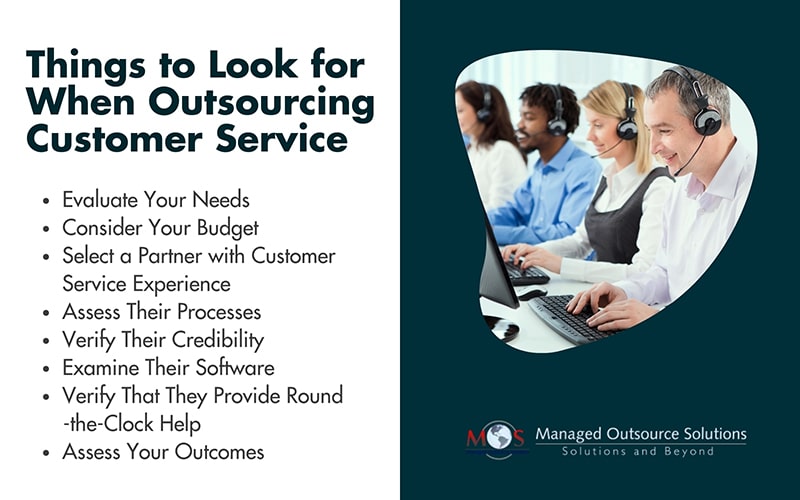Outsourced solutions are a great option for small businesses and these solutions have become more accessible via the constantly advancing internet technology. It opens up a vast pool of global talent to business organizations at competitive pricing. Properly planned outsourcing can enhance the efficiency of the organization and bring more value.
Some Statistics on Outsourcing Customer Care
According to a report by Grand View Research, the market for outsourced customer care services was estimated to be worth USD 77.12 billion in 2024 and is projected to expand at a compound annual growth rate (CAGR) of 6.6% between 2025 and 2030. This increase is ascribed to businesses outsourcing customer care tasks in an effort to save costs. Outsourcing reduces the costs of recruiting, educating, and overseeing internal customer support departments.
With the highest revenue share of 62.6% in 2024, the inbound customer services category led the global outsourced customer care services market. This was due to the growing significance of customer satisfaction and the demand for prompt, effective help. Companies are spending money on inbound services to respond quickly to consumer questions, concerns, and support requests, guaranteeing a satisfying experience. Support staff with the necessary skills are needed to handle technical inquiries and deliver precise information for more complicated products and services. Furthermore, technological developments like AI-powered contact handling improve response times and personalization, which makes inbound customer support an essential component of contemporary customer care plans.
Over the course of the projected period, the outbound customer care service category is anticipated to experience significant growth. One of the main causes of this growth is the rising need for proactive customer engagement strategies including follow-ups, surveys, and sales outreach. Companies are using outbound services to increase client retention, create prospects, and get insightful feedback. By combining cutting-edge technology like automation and predictive dialing, outbound services are becoming more effective and reaching a wider audience, allowing businesses to reach more clients faster. This market will continue to rise in the upcoming years due to the increased interest in using AI and data analytics to improve outreach tactics. The staff handling customers must be efficient, knowledgeable, pleasant and dedicated.
Factors to Consider Before Outsourcing Customer Care
- Evaluate Your Needs: Knowing exactly what you need in terms of customer service is crucial before you begin your search for an outsourcing partner. Think about the kind of customer service you require, how big your team is, and what kinds of customer service duties you must contract out. You can select the ideal partner and make sure you’re receiving the greatest deal if you know what you need in advance.
- Consider Your Budget: Improving customer service through outsourcing might be economical, but it’s crucial to take your budget into account. Making sure you’re receiving the most value for your money is crucial because outsourcing customer support may be costly. Understand all the expenses involved and seek out an outsourcing partner with competitive pricing.
- Select a Partner with Customer Service Experience: Selecting an outsourcing partner with a focus on customer service is crucial. Verify that the partner is aware of your unique customer service requirements and has prior experience working with companies in your sector. Choosing a partner with experience in customer service jobs that you need to outsource, such as answering customer questions, maintaining client accounts, or offering technical help, is ideal.
- Assess Their Processes: An important consideration when assessing possible partners is their procedures. Seek out a partner who has a history of delivering excellent customer service. Additionally, you should confirm that their procedures are clear and understandable. Inquire about their onboarding and customer service training procedures, as well as how they respond to complaints and questions from clients.
- Verify Their Credibility: Examining the standing of the outsourcing partner you are thinking about is crucial. Consult previous and present clients for recommendations, and be sure to check internet reviews. Take particular note to read client feedback in your sector. Additionally, you should confirm that the partner is well-regarded by industry associations and regulatory agencies.
- Examine Their Software: Find a partner that makes use of contemporary customer support software. Verify if their program is feature-rich, safe, and simple to use. Features like analytics, client segmentation, and automated customer support should ideally be included in the software. Additionally, the software must interface with your current systems, including help desk software, marketing automation, and CRM.
- Verify That They Provide Round-the-Clock Help: After the office door closes, customer service continues. Verify that your partner provides round-the-clock assistance so that clients can seek assistance day or night. The partner should ideally have a group of customer support representatives on hand to respond to client questions at any time of day.
- Assess Your Outcomes: Measuring your results is crucial when outsourcing customer service. Keep an eye on important customer service indicators including average response time, first-call resolution rate, and customer satisfaction. These indicators can assist you in evaluating your outsourcing partner’s performance and pinpointing areas in need of development.
Read our post: RPA and Outsourcing: A Winning Combination
Outsourcing your customer service can drive significant benefits, from cost savings to improved efficiency, but only if done thoughtfully. By considering factors like provider expertise, technological capabilities, and data security, you can ensure a seamless partnership. Leveraging the right outsourced solutions allows your business to deliver exceptional support while focusing on core operations, setting the foundation for sustained growth.





